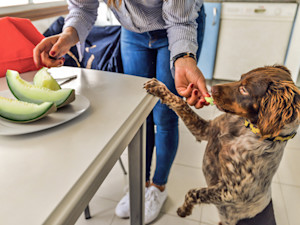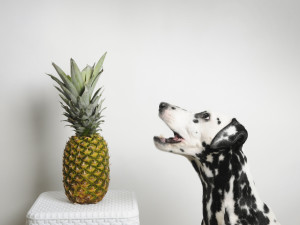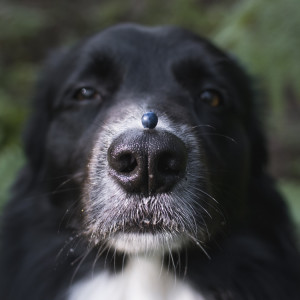In short, no, dogs shouldn’t eat lemons; this includes the peel, the flesh, and the juice. Lemons contain various chemicals and compounds that can cause issues, such as GI upset, phototoxicity, and nervous system inflammation.
Keep reading to learn more about why this citrus fruit is dangerous for your pup. We talked with Dr. Antje Joslin, a veterinarian at Dogtopiaopens in new tab, about why lemons and your dog don’t mix.
Nutrition facts: Lemons for dogs
Lemons, along with other citrus fruits, are part of the Rutaceae family. They are low in calories and packed with vitamin C and antioxidants, which are beneficial for humans.
The popular trend of adding lemon slices to water, for example, has been known to support digestive health and reduce the risk of kidney stones. Vitamin C is also important for iron absorption and heart health, while antioxidants help prevent cell damage. This is not the case, however, for our canine companions.
How much do you spend on your pet per year?
Are lemons good for dogs?
No, lemons are not good for dogs and should be avoided as a treat. Four ingredients found in the rinds and juice are known to cause medical problems in dogs. These are:
Psoralen: This compound is found in many plants and can cause phototoxicityopens in new tab and GI irritation in dogs.
Linalool: This is the essential oil that gives off the lovely citrus aroma we love, but it also leads to toxicity and liver damage if your dog ingests any.
Limonene: Limonene is an oil also commonly used with insecticides that can cause vomiting in dogs if ingested.
Citric acid: While fine for humans to eat, small amounts of this acid can lead to stomach lining irritation in dogs. If large amounts are eaten, symptoms can evolve to inflammation of the central nervous system.
“Dogs should not be fed lemons,” Dr. Joslin says. “While small quantities of lemon probably won’t harm your dog, larger quantities of lemon, lemon rind, and lemon juice concentrate can be toxic to your dog.”
Can dogs eat lemon peels?
No, lemon peels are toxic for dogs. The peels, also called the rinds, contain three of the toxic chemicals found in the fruit: psoralen, linalool, and limonene. On top of toxicity, eating lemon rinds can cause intestinal blockages in your dog — also considered an emergency.
Are lemons completely safe for dogs?
No part of a lemon is completely safe for dogs. While the flesh of the fruit itself isn’t toxic, it can still lead to an upset stomach and other GI issues due to the concentrated juices. The skin or rind of a lemon contains essential oils and citric acids known to cause neurological problems like depression and light sensitivity when consumed.
Dr. Joslin puts the risks plainly: “Lemon ingestion can cause vomiting, diarrhea, stomach upset, neurologic signs, and liver damage. Rinds and seeds can cause a choking hazard or GI obstructions.
Thankfully, the strong citrus smell typically deters dogs from wanting to eat these fruits. If your dog does get into any lemons, reach out to your vet or call the Pet Poison Helplineopens in new tab for more information on what to do. And if you witness any sudden vomiting, diarrhea, lethargy, difficulty breathing, or other unusual symptoms, have your dog seen by a veterinarian immediately.
Other fruits that are safe for dogs
Peaches are rich in antioxidants and fiber which can aid in digestion. Just be sure to avoid feeding the pit or any leaves or stems as they contain cyanide which is toxic to dogs.
Give your pup extra hydration by treating them to some watermelon. They also are low in calories and high in lycopene, a powerful antioxidant.
A lot of dogs go bananas for bananas! These fruits are high in magnesium, fiber, and potassium which can all be beneficial to both you and your pup. Bananas can also be high in sugar, though, so give them in moderation.
Other fruits that are dangerous
Similar to lemons, orange peels contain toxic oils that can lead to GI issues. The orange fruit itself is also high in sugar which can be a problem for some dogs.
Grapes are a huge no-no for dogs, likely due to the high tartaric acid found in the fruit which can cause acute kidney failure in some dogs.
While not outright toxic to your pup, avocados can still cause vomiting and diarrhea, so it’s best to avoid them as a treat.
The bottom line: Can dogs eat human food?
While lemons may not be a safe snack to share, there are plenty of other fruits and human foods your dog can enjoy as a treat. But they should be just that: an occasional treat. Make sure you ask your vet before feeding them anything new and follow the 10 percent rule: Treats should make up only 10 percent of your dog’s diet.
FAQs (People also ask):
Can dogs eat lemons?
While the fruit of the lemon isn’t toxic, it can still cause your dog minor GI upset, such as vomiting or diarrhea. The lemon rind should be completely avoided as it contains toxic chemicals and oils that can lead to neurological issues in dogs.
Is lemon juice good for dogs?
No, lemon juice is much more concentrated than the fruit itself and has a much higher amount of citric acid. Ingesting it can lead to stomach upset in dogs.
Can dogs eat lemon peels?
No, lemon peels contain chemicals toxic to dogs. If eaten, it can lead to phototoxicity, extreme GI upset, and nervous system depression.











